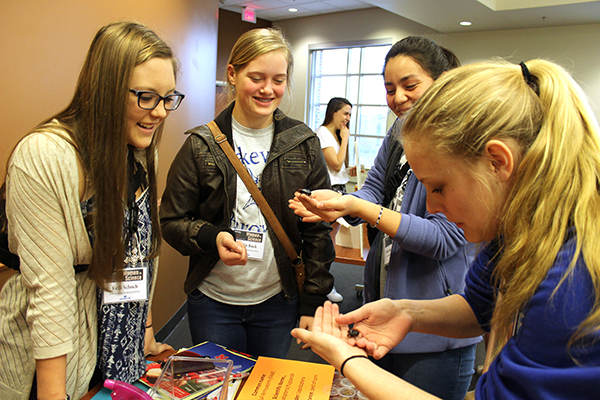
Do you have students who can see themselves as a “science kind of person” or “good at math”? Do you see a difference between the number of boys and girls who identify positively with STEM fields at varying ages of adolescence?
Explore this topic with other teachers and UNL sociologists in a new course offered by the Nebraska Math and Science Summer Institutes (NMSSI). SOCI 898: Social Psychological Processes in the STEM Classroom: Activating STEM Identities will be taught by Dr. Trish Wonch Hill this summer.
A new study, co-authored by Wonch Hill, looks at why enthusiasm for science drops among females between fourth and eighth grades and finds that gender norms, stereotypes and friendships may be playing a large role. You can read more about the study and its results, which were published in the February issue of Social Sciences, elsewhere in this newsletter and here: http://news.unl.edu/newsrooms/today/article/study-examines-how-why-adolescence-halts-girls-interest-in-science/
Wonch Hill and Dr. Julia McQuillan, chair of sociology at UNL, have developed SOCI 898 (Class # 15014) for middle-level and secondary math and science teachers to discover strategies to broaden and widen student engagement in STEM. Their research into science identity has been funded by the National Institutes of Health, and McQuillan recently presented some of the findings at a Midwest Regional Noyce Conference.
SOCI 898 covers a broad range of social psychological topics and processes to help teachers better understand how social context impacts STEM learning. Students will learn about social inequality in STEM fields, and the individual, interactional, and institutional barriers to developing a science identity for youth from a variety of social locations (rural/urban, gender, race/ethnicity, Socioeconomic Status, ELL). The class will learn about implicit bias, stereotype threat, and identity theory, and how they impact formal and informal social interactions and learning in the STEM classroom.
The course is being offered over two weeks, from 1 p.m. to 5 p.m. July 10-14 and 17-21 on the UNL City Campus, and is paired with Math 811T: Function for High School Teachers, from 8 a.m. to noon, in 110 Avery Hall. It is optional to also take the mathematics course concurrently with the sociology course; you do not need to enroll in both courses.
To enroll in UNL graduate courses in the NMSSI, follow the four steps outlined on the website, http://scimath.unl.edu/nmssi/. This year we are offering 30 math and science courses across the state and online to meet your professional development needs. Check out our course catalog to read about them all.
For all on-site NMSSI courses, current Nebraska teachers automatically qualify for a tuition reduction equal to 20 percent of in-state, graduate tuition. Additionally, Nebraska K-12 teachers can apply for supplemental NMSSI Fellowships to further defray tuition costs for NMSSI courses. Read more about the costs at: http://scimath.unl.edu/nmssi/2017/costs/. The NMSSI Fellowship Application is also now open at http://go.unl.edu/scimathapply
The Benefits of the NMSSI:
• Nebraska teachers automatically qualify for a 20 percent discount on in-state tuition at UNL
• Teachers can also apply for an additional tuition fellowship from the NMSSI: http://go.unl.edu/scimathapply
• All NMSSI courses also include a free lunch on each day of class
• The $50 UNL Graduate Studies admission fee is waived for current Nebraska teachers
• Each course is worth 3 graduate credit hours at UNL
• Enroll in one simple application through Teach Nebraska: http:///www.unl.edu/gradstudies/teachneb
Contact us at nebraskamath@unl.edu with questions.
More details at: http://scimath.unl.edu/nmssi